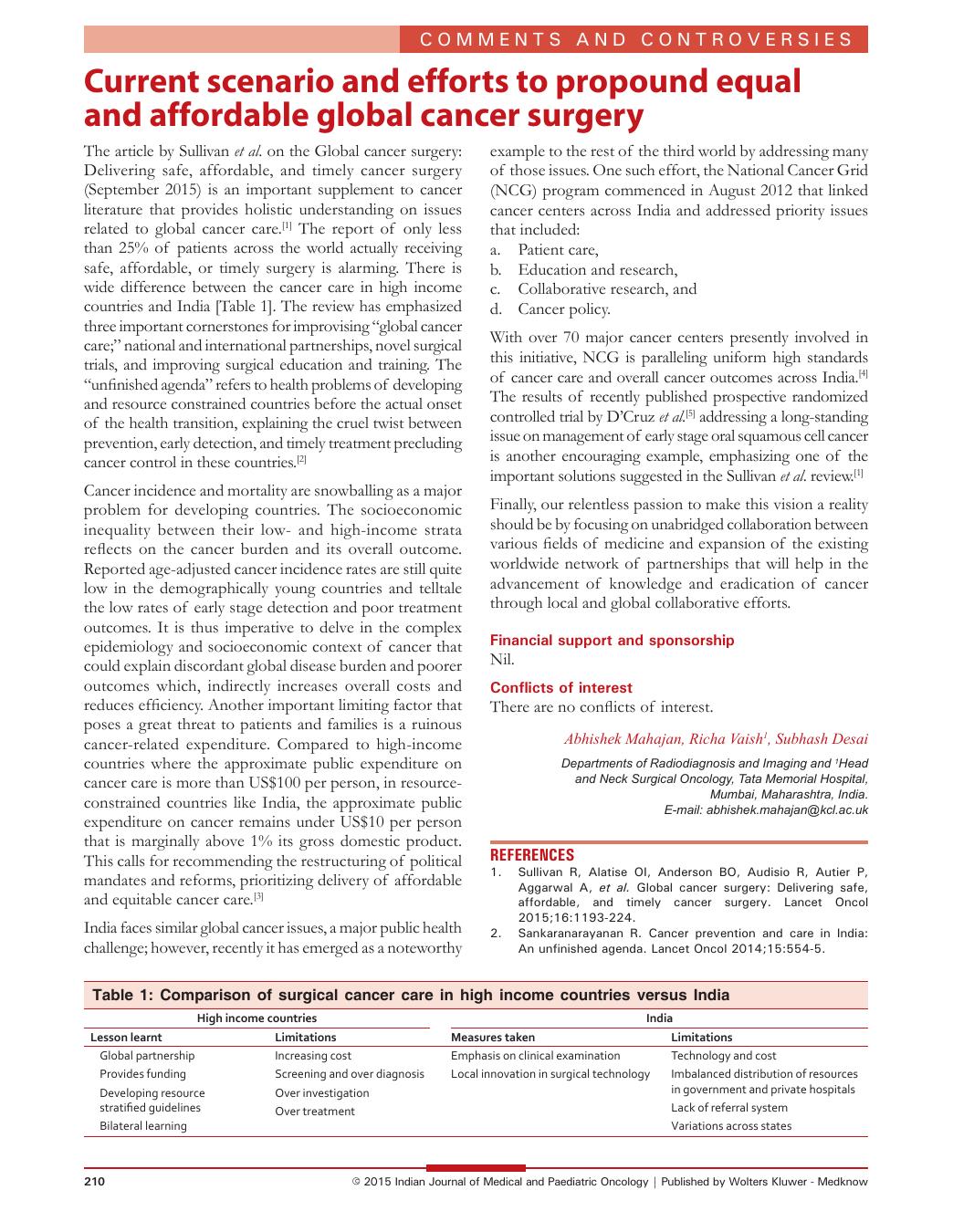Current scenario and efforts to propound equal and affordable global cancer surgery
CC BY-NC-ND 4.0 · Indian J Med Paediatr Oncol 2015; 36(04): 210-211
DOI: DOI: 10.4103/0971-5851.171540

Publication History
Article published online:
12 July 2021
© 2015. Indian Society of Medical and Paediatric Oncology. This is an open access article published by Thieme under the terms of the Creative Commons Attribution-NonDerivative-NonCommercial-License, permitting copying and reproduction so long as the original work is given appropriate credit. Contents may not be used for commercial purposes, or adapted, remixed, transformed or built upon. (https://creativecommons.org/licenses/by-nc-nd/4.0/.)
Thieme Medical and Scientific Publishers Pvt. Ltd.
A-12, 2nd Floor, Sector 2, Noida-201301 UP, India
The article by Sullivan et al. on the Global cancer surgery: Delivering safe, affordable, and timely cancer surgery (September 2015) is an important supplement to cancer literature that provides holistic understanding on issues related to global cancer care.[1] The report of only less than 25% of patients across the world actually receiving safe, affordable, or timely surgery is alarming. There is wide difference between the cancer care in high income countries and India [Table 1]. The review has emphasized three important cornerstones for improvising “global cancer care;” national and international partnerships, novel surgical trials, and improving surgical education and training. The “unfinished agenda” refers to health problems of developing and resource constrained countries before the actual onset of the health transition, explaining the cruel twist between prevention, early detection, and timely treatment precluding cancer control in these countries.[2]
Table 1
Comparison of surgical cancer care in high income countries versus India
 Cancer incidence and mortality are snowballing as a major problem for developing countries. The socioeconomic inequality between their low- and high-income strata reflects on the cancer burden and its overall outcome. Reported age-adjusted cancer incidence rates are still quite low in the demographically young countries and telltale the low rates of early stage detection and poor treatment outcomes. It is thus imperative to delve in the complex epidemiology and socioeconomic context of cancer that could explain discordant global disease burden and poorer outcomes which, indirectly increases overall costs and reduces efficiency. Another important limiting factor that poses a great threat to patients and families is a ruinous cancer-related expenditure. Compared to high-income countries where the approximate public expenditure on cancer care is more than US$100 per person, in resource-constrained countries like India, the approximate public expenditure on cancer remains under US$10 per person that is marginally above 1% its gross domestic product. This calls for recommending the restructuring of political mandates and reforms, prioritizing delivery of affordable and equitable cancer care.[3]
Cancer incidence and mortality are snowballing as a major problem for developing countries. The socioeconomic inequality between their low- and high-income strata reflects on the cancer burden and its overall outcome. Reported age-adjusted cancer incidence rates are still quite low in the demographically young countries and telltale the low rates of early stage detection and poor treatment outcomes. It is thus imperative to delve in the complex epidemiology and socioeconomic context of cancer that could explain discordant global disease burden and poorer outcomes which, indirectly increases overall costs and reduces efficiency. Another important limiting factor that poses a great threat to patients and families is a ruinous cancer-related expenditure. Compared to high-income countries where the approximate public expenditure on cancer care is more than US$100 per person, in resource-constrained countries like India, the approximate public expenditure on cancer remains under US$10 per person that is marginally above 1% its gross domestic product. This calls for recommending the restructuring of political mandates and reforms, prioritizing delivery of affordable and equitable cancer care.[3]India faces similar global cancer issues, a major public health challenge; however, recently it has emerged as a noteworthy example to the rest of the third world by addressing many of those issues. One such effort, the National Cancer Grid (NCG) program commenced in August 2012 that linked cancer centers across India and addressed priority issues that included:
- Patient care,
- Education and research,
- Collaborative research, and
- Cancer policy.
With over 70 major cancer centers presently involved in this initiative, NCG is paralleling uniform high standards of cancer care and overall cancer outcomes across India.[4] The results of recently published prospective randomized controlled trial by D’Cruz et al.[5] addressing a long-standing issue on management of early stage oral squamous cell cancer is another encouraging example, emphasizing one of the important solutions suggested in the Sullivan et al. review.[1]
Finally, our relentless passion to make this vision a reality should be by focusing on unabridged collaboration between various fields of medicine and expansion of the existing worldwide network of partnerships that will help in the advancement of knowledge and eradication of cancer through local and global collaborative efforts.
Financial support and sponsorshipNil.


 PDF
PDF  Views
Views  Share
Share

